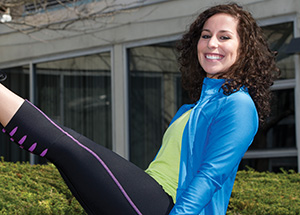Senior Profile / Miranda Carbone: A Different Mindset
When it comes to pursuing her goals, graduating senior Miranda Carbone isn’t afraid to follow what she calls “alternative routes.”
it comes to pursuing her goals, graduating senior Miranda Carbone isn’t afraid to follow what she calls “alternative routes.”
The New Castle, Pa., native came to Pitt set on studying neuroscience and following a premedical school program. Those plans shifted somewhat when Carbone discovered Pitt’s aerobics minor, available through the School of Education’s health and physical activity major. She added both the minor and the major to her premed track of study.
“Exercise science was amazing,” Carbone said of her first experiences taking classes through the Department of Health and Physical Activity. She liked the program’s lab work, and she cited hands-on projects—such as conducting health screenings for walk-in patients at Oakland’s VA Pittsburgh Healthcare System hospital—as a big part of her decision to add the major.
“You don’t realize how much of our medical system is focused on repair versus keeping people healthy. I think the health and physical activity major is so much about prevention that it has influenced me. Even on my way through medical school, I’m always going to advocate for exercise and eating right. I’m still premed, but I’m premed with a totally different mindset,” Carbone said.
Her mindset was further refined this past semester, when Carbone completed an internship in the UPMC Mercy Hospital’s Department of General Surgery, where the undergraduate worked 500 hours in the hospital’s thoracic surgery and trauma units.
“Basically I got to be a medical-school student. I got to scrub into surgeries, I made incisions, I pulled chest tubes. It was an extremely challenging but exciting way to reaffirm that I am right for the medical field,” Carbone said.
“The entire time, I was involved in patient care, both on the floors and in the operating room, and I was able to practice interviewing, examination, and surgical skills. Better yet, I learned more about the doctor-patient interaction and even the doctor-doctor interaction, which is rarely seen by those outside of medical school,” she added.
The experience also helped Carbone further refine her plans to include a likely specialization in pediatrics—a level of clarity many young physicians don’t attain until well into medical school.
“Pediatrics really interests me because as soon as that child is born, it’s brought to you,” she said, giving the pediatrician an early opportunity to stress the healthful, preventive habits she finds so important. And from her experiences in the surgical suite, Carbone discovered that “I’d rather have the clinical role where I’m working with people, rather than working on an anesthetized body for eight hours,” she said.
For her internship, Carbone worked with Omar Awais, assistant professor of cardiothoracic surgery in Pitt’s School of Medicine, and Carma Sprowls Repchek, assistant professor and clinical internship coordinator in the Department of Health and Physical Activity, to tailor the internship to fit her interests. For a health and physical activities major, Carbone said, such an involved, medicine-intensive internship is unusual. Many majors pursue careers in the health-care field as physician assistants or physical therapists rather than as physicians. The internship ran from January to March 2014.
Carbone has pursued other experiential learning as well. For the past two years, she has taught aerobics classes on campus, underscoring her belief in the fundamental importance of exercise.
While undergraduates are rarely hired to teach fitness classes, Laura Fonzi felt certain Carbone was up to the task. Fonzi is a faculty clinical instructor and aerobics minor coordinator in the Department of Health and Physical Activity.
“You have to be an exceptional student to teach in the program, especially for an underclassman, and Miranda was,” said Fonzi, who taught Carbone in several classes.
“The students she has taught really enjoy her classes. She’s energetic and runs challenging classes, but she has enough of a science background that she understands how to modify exercises and do things safely,” Fonzi said.
Carbone’s qualities as an on-campus leader were recognized by Omicron Delta Kappa, Pitt’s leadership honor society, which inducted her into the organization in 2013. She became its president last fall.
She will soon move to Hershey, Pa., where she hopes to spend a “gap year” working in the field of medical ethics before entering medical school in the fall of 2015.
“There’s a lot that I’ll miss about Pitt, and it’s kind of sad to let all that go,” Carbone said. “I’ve made a lot of friends here and even my professors I’ve come to see as mentors and friends.”
Other Stories From This Issue
On the Freedom Road

Follow a group of Pitt students on the Returning to the Roots of Civil Rights bus tour, a nine-day, 2,300-mile journey crisscrossing five states.
Day 1: The Awakening
Day 2: Deep Impressions
Day 3: Music, Montgomery, and More
Day 4: Looking Back, Looking Forward
Day 5: Learning to Remember
Day 6: The Mountaintop
Day 7: Slavery and Beyond
Day 8: Lessons to Bring Home
Day 9: Final Lessons

